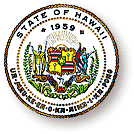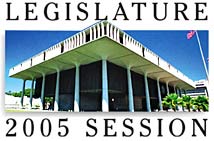Isle officials,
execs set for
China trade mission
The $150,000 state trip,
led by Lingle and wrapping
in Korea, aims to seed ventures
China's dour parliament will fill with the melodious strains of the hula next month when a large Hawaii trade and cultural mission arrives for a 10-day Chinese visit.
The mission will be the largest-ever from Hawaii to Asia, according to the Department of Business, Economic Development and Tourism.
"It's about rising above the white noise generated by markets like this and showing what Hawaii really has to offer," said department Director Ted Liu, a former Hong Kong investment banker.
The itinerary includes Shanghai, Beijing and the southern province of Guangdong -- ancestral home to most of Hawaii's Chinese -- before wrapping up in Korea.
Lingle's jam-packed schedule includes tentative meetings with either Chinese President Hu Jintao or Prime Minister Wen Jiabao, the powerful mayors of Shanghai and Beijing, and the opening of a coveted state business and tourism office in Beijing.
Liu said nurturing links with government officials is crucial to obtaining a foothold in China's market, where the government still exercises tremendous control over business activity.
"The countries and regions that are going to do well today are those that are connected," he said.
Previously, Nevada -- considered a key Hawaii competitor for the Chinese travel dollar -- was the only U.S. state licensed to open a tourism office in China.
More than 30 state officials will take part in the trip, at a cost to the state of more than $150,000.
Forty-three Hawaii businesses also will send representatives at their own expense, many participating in one-on-one "corporate matchmaking" sessions with potential Chinese business partners.
"It's pretty exciting. There's a lot of potential for us in China and this will help us set up a presence there," said Kai Bouvaird, who operates fledgling Honolulu animation studio Cause & F/X.
University of Hawaii officials will sign various agreements with Chinese universities and will join the tourism industry in promoting the state's hospitality expertise as a commodity for export to China, where resort properties -- and their requisite management needs -- are proliferating.
The mission's long list of business events also will include the signing of an agreement between the state High Technology Development Corp., which runs business incubation programs, and China's largest technology park.
The pact commits the corporation to provide incubation space to Chinese companies seeking an American beachhead in Hawaii, and vice versa.
Lingle and tourism officials also will meet with leaders of China's travel industry and give interviews to Chinese travel media.
State tourism liaison Marsha Weinert said this is aimed at feeding Chinese demand for Hawaii vacations in the event that U.S. visa restrictions, a major barrier to Chinese tourist arrivals, are one day relaxed.
"There's no question that the floodgates are not open until that happens. But this is about positioning Hawaii in the marketplace for the day the Chinese can travel freely," Weinert said.
While in Beijing, Lingle will host a reception at the Great Hall of the People, China's parliament, with entertainment provided by local artists including Ka'ala Boys, Amy Hanaialii Gilliom and performers from the Polynesian Cultural Center. Similar performances will be held in Shanghai and Guangzhou.
The trip is intended to build on a similar, but much smaller, mission last summer including Lt. Gov. James "Duke" Aiona. In the wake of that trip, Hawaii obtained permission to open the Beijing tourism office.
Lingle’s China trip
puts off any vetoes
Gov. Linda Lingle says the timing of her upcoming 10-day trip to China and Korea is unlikely to affect her decisions on the more significant pieces of legislation now before her for consideration.
|
|
"I would doubt that there would be any vetoes before I left, that would be unlikely," Lingle said at a news conference yesterday.
The governor's delegation is scheduled to leave for China June 8 and return June 19.
Lingle noted that she has until July 12 -- 45 days from the end of the regular session -- before having to make any final determination on bills.
While she's gone, Lingle said, her staff in Hawaii will continue to review all pending proposals and advise her of their assessments when she returns.
"This gives them a good block of time when I'm not here on a daily basis where they can really carry out that (review) process," Lingle said of her staff. "That was part of the timing of the trip and it will work very well."
Other bills pending before Lingle include:
» A proposal to create a three-tier system for driver's licenses for 16- and 17-year-olds.
» A measure to allow any public employee union to set up a health fund trust plan for its members.
» A proposal to increase the state's minimum wage by $1 over the next two years.
» A campaign spending reform proposal that prohibits fund raising on state and county property, and limits campaign contributions from out of state to 20 percent of the total contributions for each reporting period.
www.hawaii.gov/gov/
E-mail to City Desk
[News] [Business] [Features] [Sports] [Editorial] [Do It Electric!]
[Classified Ads] [Search] [Subscribe] [Info] [Letter to Editor]
[Feedback]


